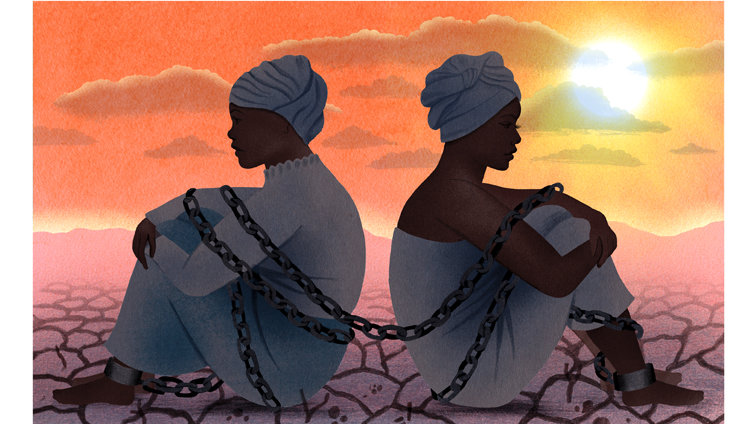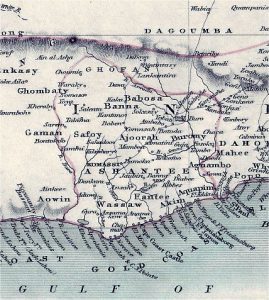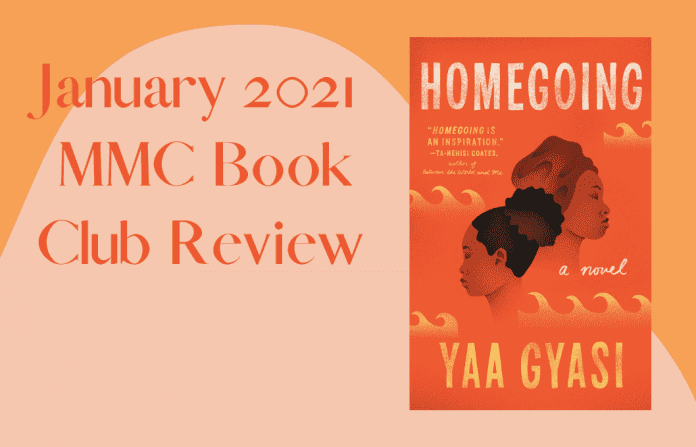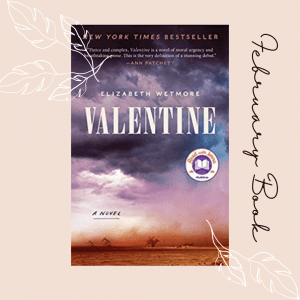
I heard about Homegoing a few years ago. It sat on my TBR bookshelf. It called to me, with a vibrant orange cover and the summary on the back of two half-sisters and the way their lives diverged based on their families and actions. But I waited to read it, knowing I wanted it in our MMC Book Club lineup.
It was so worth the wait.
This debut novel by Yaa Gyasi begins and ends in Africa, in present-day Ghana. It follows the lives of two families; while they all originate from one mother Maame, their lives are simultaneously different but the same. It is a story of tribalism, imperialism, colonialism, slavery, civil rights, and the collective nonfiction history of fictional characters.
It’s difficult to identify each chapter as such because they are really every person’s story.
It starts with Effia and Esi. These are the two daughters of Maame, although they never meet one another. Maame was an Asante slave in a Fante home who fled after setting a brush fire. She left behind her newborn daughter Effia, who was raised as Fante. Maame settles and marries an Asante “Big Man” or chief and gives birth to another daughter, Esi.

For Effia, life is pleasantly comfortable.
She was the daughter of a prominent man in their village and called “Effia the Beauty” for her looks. Her mother Baaba was cruel to her yet Effia did not know why (we know it is because she is not her true mother). She was to be married to a future chief of the village, but her mother forced her to hide her menstrual cycle and claimed she is barren. Thus, Effia was married to James Collins, a British governor at the Cape Coast Castle. The British and Dutch were prominent traders and slavers there, but her marriage was considered a great honor to her family. She had a happy marriage despite the noises she could hear underneath the castle. She later learned that her real mother was a slave, and she only has a black stone left with her to provide any information about her mother.
For Esi, life started out pleasantly but ended with turmoil and pain.
Born of the “Big Man” chief and warrior, she was a beloved princess with a bright future. One day, a captured slave and playmate asked her to write to her own father to let him know she is alive. Esi wrote the letter out of pity, as she knew that her mother was once a slave. This innocent mistake cost her greatly; the slave’s father and tribe raided Esi’s village, killing her father and mother. She was taken as a slave herself and sold to the British, kept in the dungeons under the same castle that her sister Effia lived in, with only the black stone given to her by her mother. She hid the stone in the walls of the appalling dungeon. She is raped and transported to America, leaving her stone behind but carrying a child in her belly.
Every chapter after this is the story of a descendent of either Effia or Esi.
What we liked the most was how each story of each person was threaded together by their family while also being different from their half-relatives.
But the one thing that ties all their stories together was the search for life and happiness, no matter where he or she was. Dani, one of our members, stated, I would say that each of them struggled in some way and could not find happiness in how their life was going. No matter which generation they all had hard lives.” But they tried to be happy and to succeed despite all the struggles that generation faced. From the tribal fighting in Africa to slavery in colonial America; Jim Crow laws and segregation; the civil rights movement and racism continuing even today; all were searching for a better life.
I really enjoyed the title and how the story comes full circle.
The word “homegoing” is taken from an older African belief. This belief holds that a slave’s spirit is allowed to return to Africa upon their death, thus returning home. And home is a theme in this book with various different locations and ideas. Is home where we are born? Is it a place? Is it with our people or our culture?
And what if the home is not a safe place? There was a quote from the book that stated,
Sometimes you cannot see that the evil in the world began as the evil in your home.
This was in reference to the slave trade, which was facilitated by Africans and the white colonists. So for a character who traces roots to enslaved Africans brought to America, where is home? Does he or she wish to experience homegoing if that home is where the evil originated?

This book tackles many historical events, including the Anglo-Asante wars, the introduction of cacao in Ghana, slavery in and out of Africa, emancipation in America, and the segregation and racism after this. Through each character, we are viewing these events in a more intimate way and watching how they affect every person and generation.
Eventually, the lines of Effia and Esi meet and return to Ghana. So while their spirits may not have returned, their family experiences homegoing. In our opinion, it was a beautiful ending to a collection of intertwined stories. Yaa Gyasi’s debut novel educates and informs this generation of the collective struggle and lives over hundreds of years.
I rarely give 5-star ratings on Goodreads, but Homegoing received it with ease.
We would recommend this book to all those who enjoy fictional history and want to see and learn more about the lives of Africans and Black Americans, present and past.



 Come back next month as we read
Come back next month as we read 







